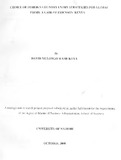| dc.contributor.author | Wamukoya, David M | |
| dc.date.accessioned | 2013-05-15T12:24:11Z | |
| dc.date.available | 2013-05-15T12:24:11Z | |
| dc.date.issued | 2008-10 | |
| dc.identifier.citation | Masters Of Business Administration (MBA) Degree | en |
| dc.identifier.uri | http://erepository.uonbi.ac.ke:8080/xmlui/handle/123456789/23211 | |
| dc.description | A management research project submitted in partial
fulfilment of the requirements for the Degree Of
Master of Business Administration (MBA), Faculty of
Commerce, University of Nairobi | en |
| dc.description.abstract | Global companies are left with no choice but to compete on a global scale. This is
occasioned by shrinking of markets within their immediate environment, spreading of
customers and intensification of business. How they spread out and penetrate other foreign
markets remains critical in them achieving their business objectives. Foreign markets are
characterized by change of environment and increased competition. The choice of entry
strategies into these· countries remains critical to their success.
The study focused on strategies used by Ericsson to enter the Eastern Africa region using
an operational base in Nairobi Kenya. Data was collected using in-depth interviews with
senior managers at Ericsson Kenya. Information was analyzed using content analysis.
From the findings Ericsson established Ericsson Kenya as a subsidiary to help it conquer
the Eastern Africa market in the Telecommunication sector. Whereas it exports equipment
to the region from outside plants, Ericsson has set up a regional office in Kenya to serve as
a centre for exportation of service to the region. The study revealed that for Ericsson,
keeping close to the customer and offering good service remains very strategic in their
foreign business expansion in the region. While following the values of the parent company,
Ericsson Kenya has allowed localization through development and training of the locals to
run the regional company. Ericsson Kenya collaborates and co-operates a lot with other
regions within the market unit in a bid to benefit from economies of scale and information
exchange. | en |
| dc.language.iso | en | en |
| dc.publisher | University of Nairobi | en |
| dc.title | Choice of foreign country entry strategies for global firms: a case of Ericsson Kenya | en |
| dc.type | Thesis | en |
| local.publisher | School of Business | en |

